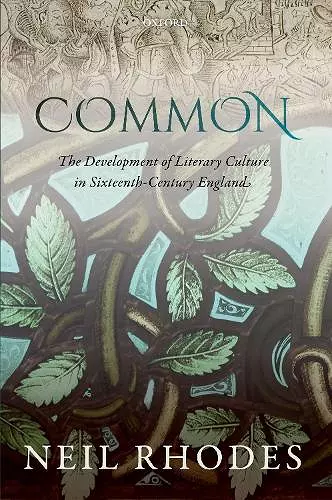Common: The Development of Literary Culture in Sixteenth-Century England
Format:Paperback
Publisher:Oxford University Press
Published:3rd Jun '21
Currently unavailable, and unfortunately no date known when it will be back

This volume explores the development of literary culture in sixteenth-century England as a whole and seeks to explain the relationship between the Reformation and the literary renaissance of the Elizabethan period. Its central theme is the 'common' in its double sense of something shared and something base, and it argues that making common the work of God is at the heart of the English Reformation just as making common the literature of antiquity and of early modern Europe is at the heart of the English Renaissance. Its central question is 'why was the Renaissance in England so late?' That question is addressed in terms of the relationship between Humanism and Protestantism and the tensions between democracy and the imagination which persist throughout the century. Part One establishes a social dimension for literary culture in the period by exploring the associations of 'commonwealth' and related terms. It addresses the role of Greek in the period before and during the Reformation in disturbing the old binary of elite Latin and common English. It also argues that the Reformation principle of making common is coupled with a hostility towards fiction, which has the effect of closing down the humanist renaissance of the earlier decades. Part Two presents translation as the link between Reformation and Renaissance, and the final part discusses the Elizabethan literary renaissance and deals in turn with poetry, short prose fiction, and the drama written for the common stage.
[...] this is an extraordinary study. Without denying or side-lining the social and economic dimensions, Rhodes sets out to tell a distinctively literary story about Tudor English culture. He covers an enormous range of materials from disparate periods, yet rarely sounds like anything but an expert. [...] his treatment of it will resonate with the impression of many literary critics that something special happened in the final decades of the sixteenth century. * Beth Quitslund, the Spenser Review *
This ambitious and wide-ranging book offers nothing less than a new account of English literary culture during the sixteenth century. * Hannah Crawforth, Literature & History *
No such summary can do justice to the ambitious, encyclopedic scope of Rhodes's erudite study. Common brings together topics, texts, and authors often discussed independently of each other, constructing a vast assemblage that produces not only countless local insights but also a coherent general picture of the sixteenth century... Rhodes's study is smart, ambitious, and essential. It will undoubtedly reshape, for years to come, our conception of the sixteenth century in England. * Corey McEleney, Renaissance Quarterly *
Common is a richly illustrated argument, and a welcome contribution to the great debate on early modern STEM, Should Teaching English Matter? * Esther Osorio Whewell, Cambridge Quarterly *
This is an erudite and absorbing book. Rhodes has rewritten big portions of arguments about the development of early modern literary history in England, which makes his book indispensable for further scholarly exploration of this period * Goran Stanivukovic, Renaissance and Reformation / Renaissance et Reforme *
No summary or paraphrase could fully capture the experience of reading this ambitious, exhaustively researched book. * Jenny C Mann, The Review of English Studies *
One antonym for the common (not much, if at all, mentioned by Rhodes) is the 'rare'. This is a book of rare distinction -- in its width of reading, its scale of ambition, its Empsonianly extended apprehension of the English language. If only books this good were more common. * Robert Stagg, Renaissance Studies *
The 32-page bibliography and hundreds of footnotes testify to the book's scholarship ... Summing up: Recommended * CHOICE *
As humanities scholars scurry to complete monographs at a speed that satisfies the demands of tenure and promotion, it has become sadly rare to produce scholarly books with a magisterial vista that engages a broad expanse of readers. Neil Rhodes's Common is an admirable exception to this trend. At its best, the book offers a fresh, new version of C. S. Lewis's 1954 English Literature in the Sixteenth Century Excluding Drama (Oxford: Oxford University Press), one that not only includes (and culminates with) drama but also speaks to the social, political, and religious "backgrounds" of English Renaissance literature. * Jessica Wolfe, Sixteenth Century Journal *
The story that Rhodes has to tell is fascinating, and this book deserves an important place in our understanding of how early modern English literature developed. * Beth Quitslund, Ohio University *
ISBN: 9780192844811
Dimensions: 234mm x 156mm x 20mm
Weight: 550g
368 pages